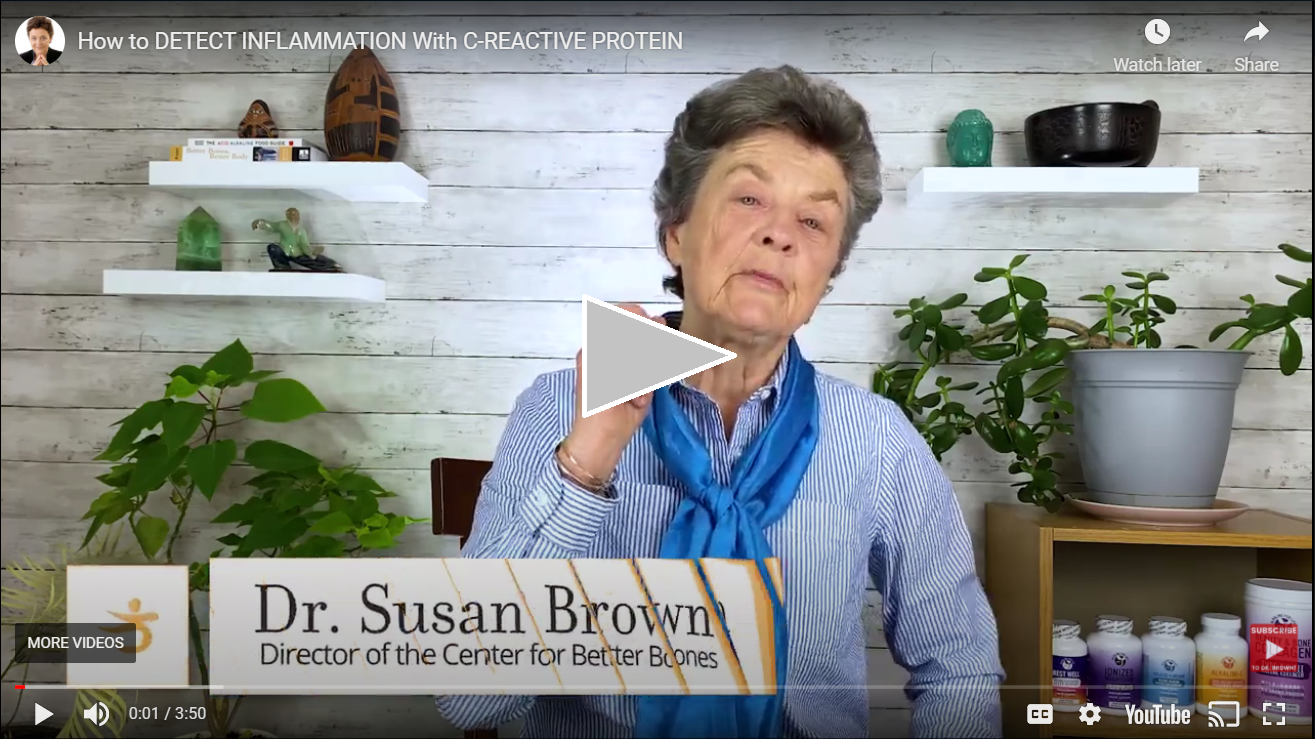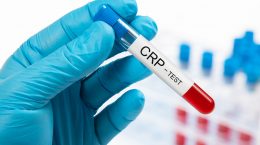Published on June 20, 2022
Video Review: Dr. Susan Brown describes c-reactive protein and the importance of measuring your levels of chronic inflammation
Inflammation, as a major cause of osteoporosis and many other chronic diseases, can go unnoticed and be very damaging long term. C-reactive protein (CRP) is a byproduct of chronic inflammation, with some research suggesting that the level of CRP, measured using a test called hs-CRP, can predict heart disease even ten years before diagnosis.
In today’s quick, informational video, Dr. Susan Brown of BetterBones.com explains the normal process of inflammation, why the body produces CRP, how the high sensitivity C-Reactive Protein test can detect inflammation, and what levels to look for.
Watch the Video
After watching the video, be sure to make note of our added details below!
How to DETECT INFLAMMATION With C-REACTIVE PROTEIN (CRP)
Here is a quick summary of what this video discusses, along with additional information and details from GrassrootsHealth:
- Chronic, low-level inflammation has been linked to a number of chronic diseases ranging from cardiovascular disease and diabetes to mental health disorders, cancer, and osteoporosis
- Inflammation is part of the process of breaking down and re-generating tissue, which is supposed to be re-built. In certain situations, the body is unable to re-build the tissues, and inflammation becomes continual and damaging.
- CRP is generated by the liver when the body has a need to repair itself; it is a signal for repair that gets ‘louder’ when unable to do the repair
- A series of studies have shown that CRP is a better predictor of cardiovascular risk than other blood tests such as cholesterol. In fact, measuring CRP allows doctors to predict your risk of having a heart attack over the next 5 to 10 years if you have risk factors for heart disease. It is also an early sign of bone weakening in osteoporosis and of many other disorders.
- The higher the inflammation levels, the higher the risk of developing chronic disease. Sometimes an individual will experience symptoms such as joint pain or fatigue, but often times there will be no symptoms until disease occurs. Therefore, the only way to know your inflammation level is to measure it.
- The test to use to measure levels of inflammation is the high sensitivity C-reactive protein (hs-CRP) test, also called the cardio C-reactive protein test
- The level of hs-CRP to target is a very low level, such as 0.5 mg/L or less
- An analysis of the GrassrootsHealth cohort showed that almost three fourths (74%) of participants had hs-CRP levels below 1.0 mg/L (low risk), 19% had levels between 1.0 and 3.0 mg/L (average risk), and 8% had levels between 3.1 and 10.0 mg/L (increased risk)
- A high hs-CRP level indicates the body needs to repair, but is unable to. Some nutrients, including vitamin D, magnesium, and omega-3s may help the body with this repair process and lower levels of inflammation and CRP.
- Dr. Brown discusses her favorite ways to repair… watch the video now!
Measure Your Level of hs-CRP and Important Nutrients
 Having and maintaining healthy nutrient levels can help improve inflammation levels, leading to better health now and for your future. Choose which to measure as well, such as your vitamin D, omega-3s, and essential minerals including magnesium and zinc, by creating your custom home test kit today. Take steps to improve the status of each of these measurements to benefit your overall health. You can also track your own intakes, symptoms and results to see what works best for YOU.
Having and maintaining healthy nutrient levels can help improve inflammation levels, leading to better health now and for your future. Choose which to measure as well, such as your vitamin D, omega-3s, and essential minerals including magnesium and zinc, by creating your custom home test kit today. Take steps to improve the status of each of these measurements to benefit your overall health. You can also track your own intakes, symptoms and results to see what works best for YOU.
Enroll and test your levels today, learn what steps to take to improve your status of vitamin D (see below) and other nutrients and blood markers, and take action! By enrolling in the GrassrootsHealth projects, you are not only contributing valuable information to everyone, you are also gaining knowledge about how you could improve your own health through measuring and tracking your nutrient status, and educating yourself on how to improve it.
Help everyone Move Research into Practice with vitamin D and other nutrients! As a special birthday gift to everyone, in honor of the science, we have created a special scholarship fund for anyone to donate to that will go towards helping others participate. Your donation will allow anyone to get help with funding their participation when they need it.
Text-to-give: Text Daction to 44321 to add to our Scholarship Fund.






